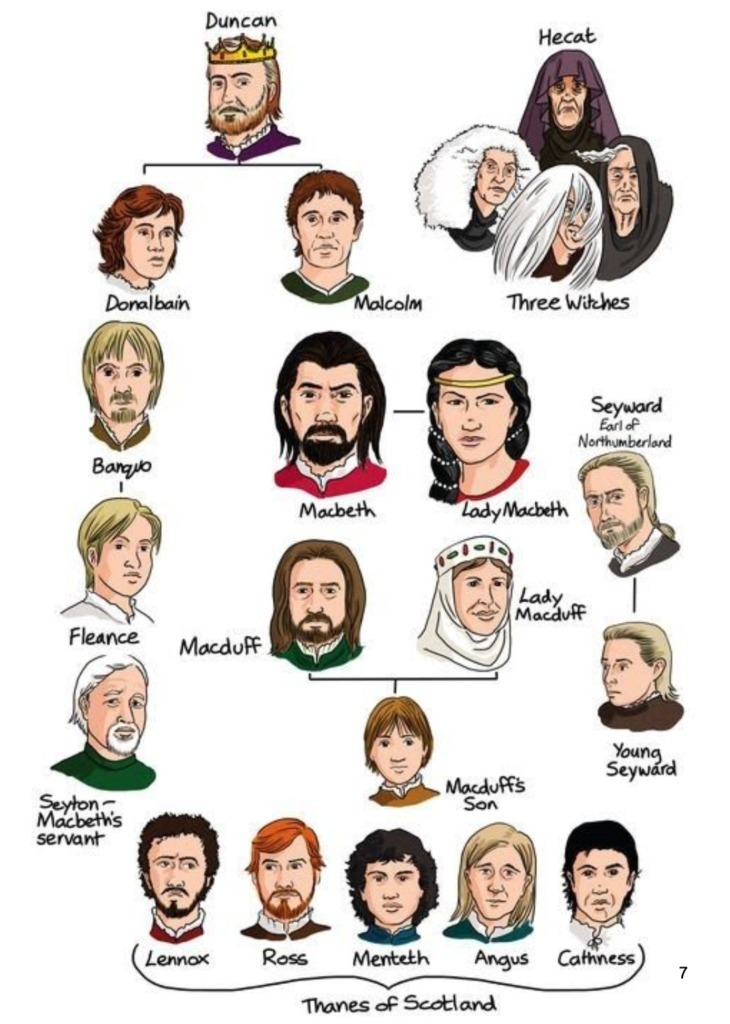MACBETH
Hello readers, here I am going to write down my thinking activity and answer some questions. This blog is inspired by Dr. Dilip Barad sir. This blog on Shakespeare's play Macbeth.
Here, I am writing about the Writer of our tragedy Macbeth Mr. William Shakespeare.
Mr. William Shakespesre
"All the world's a stage, and all the men and women merely players. They have their exits and their entrances, and one man in his time plays many parts."
William Shakespeare was born in the town of Stratford-upon-Avon in Warwickshire, England, and baptized on 26 April 1564, according to the Parish register. His date of birth is popularly believed to be 23 April, but this is conjectural. Shakespeare’s mother, Mary Arden, was the daughter of a wealthy landowning farmer; his father, John Shakespeare, was a tradesman and an elected alderman. Scholars believe that Shakespeare was educated at King’s New School, the local grammar school. Shakespeare was taught Latin grammar and Latin classics.
A marriage license was issued to Shakespeare in 1582, recording his marriage to Anne Hathaway of a neighboring village. Six months later, Anne gave birth to their first daughter, Susanna. Two years later, twins, a son Hamnet and a daughter Judith were born to the couple. Hamnet died at the age of eleven. There is no extant record of Shakespeare's life during the years between the birth of the twins and his first appearance in London as a dramatist.
Shakespeare's Works: Though Shakespeare wrote several poems, the bulk of his work was drama. His plays cover a large variety of themes and plots, and display both his sensitivity to the world around him as well as his sharp, critical, and probing intelligence. Shakespeare wrote at least 38 plays and over 150 short and long poems.
Here I am putting the video of Shakespeare's Works:
- ALL'S WELL THAT ENDS WELL
- ANTONY AND CLEOPATRA
- AS YOU LIKE IT
- COMEDY OF ERRORS
- CORIOLANUS
- CYMBELINE
- HAMLET
- JULIUS CAESAR
- KING JOHN
- KING LEAR
- LOVE'S LABOR'S LOST
- LUCRECE
- MACBETH
- MEASURE FOR MEASURE
- MERCHANT OF VENICE
- MERRY WIVES OF WINDSOR
- MIDSUMMER NIGHT'S DREAM
- MUCH ADO ABOUT NOTHING
- OTHELLO
- PERICLES
- PHOENIX AND TURTLE
- RICHARD II
- RICHARD III
- ROMEO AND JULIET
- SONNETS
- TAMING OF THE SHREW
- TEMPEST
- TIMON OF ATHENS
- TITUS ANDRONICUS
- TROILUS AND CRESSIDA
- TWELFTH NIGHT
- TWO GENTLEMEN OF VERONA
- TWO NOBLE KINSMEN
- VENUS AND ADONIS
- WINTER'S TALE
"Tomorrow, and tomorrow, and tomorrow,
Creeps in this petty pace from day to day,
To the last syllable of recorded time;
And all our yesterdays have lighted fools
The way to dusty death. Out, out, brief candle!
Life's but a walking shadow, a poor player,
That struts and frets his hour upon the stage,
And then is heard no more. It is a tale
Told by an idiot, full of sound and fury,
Signifying nothing"
Introduction of Play Macbeth
"Double, double toil and trouble;
Fire burns, and cauldron bubble”
The extant text of Macbeth is, predictably enough, poorly preserved and bears evidence of several revisions. Most critics, however, agree that the play was written between 1603 and 1606. The Tragedie of Macbeth, in the First Folio of 1623. It was registered in the books of the Stationers Company on 8 November 1623 by Blount and Jaggard, the publishers of the folio, as one of the plays " not formerly entered to other men "
Macbeth was also a real man, a king of 11th century Scotland who led a life filled with as much murder, treachery, and drama as the tragic hero. Three witches tell the Scottish general Macbeth that he will be King of Scotland. Encouraged by his wife, Macbeth kills the king, becomes the new king, and kills more people out of paranoia. The most important scene of Macbeth is the death of Lady Macbeth.
In Macbeth, there are many characters in the play. Macbeth, Lady Macbeth, Banquo, Duncan, The Three Witches, Macduff.
So I am putting here the picture of characters for better understanding.
"Nothing is but what is not."
Macbeth-
Macbeth is the title character of Shakespeare’s play Macbeth. He is the Scottish general who holds three successive titles in the play.
"Fair is foul, and foul is fair, hover through fog and filthy air"
First the Thane of Glaims, Thane of Cawdor, The king of Scotland. We find him as a tragic hero here in this play. His tragic flaw is Ambition where in he is willing to give everything for the crown.
Banquo- Banquo is Macbeth’s brave and noble best friend, as well as his second victim. Banquo enters the play with Macbeth after both have fought valiantly for Duncan’s side in a recent battle. In act lll, murderers kill Banquo at Macbeth’s command and try to kill his young son, Fleance, who manages to get away.
Duncan- Duncan is generous & noble & he is also grateful. Duncan praises Macbeth for the great courage and heroism in revolt and calls him a “noble kings man’’.
1) Feminist Reading of Lady Macbeth.
ANSWER: Lady Macbeth-
In Shakespeare’s play Macbeth, he presents the conflicting character of Lady Macbeth. This character is indeed wonderful creation by Shakespeare. Lady Macbeth is shown as an iron-willed character willing to "I have given suck, and knowHow tender ’tis to love the babe that milks me.I would, while it was smiling in my face, Have plucked my nipple from my child’s boneless gums, And dash the brains out, had I so sworn as you Have done to this" to later being shown as possessed by nightmares of guilt how could such a strong character so quickly fall prey to uneasiness? According to materialist feminism theory, despite her earlier show of strength, Lady Macbeth’s eventual weakness is a result of a patriarchal portrayal of her gender. Macbeth is the wife of Macbeth. She is reduced to an insignificant person, who is haunted by hallucinations and she feels remorse and guilt. she is the victim of the patriarchy society.
"Come, thick night,
And pall thee in the dunnest smoke of hell,
That my keen knife see not the wound it makes,
Nor heaven peep through the blanket of the dark,
To cry, ‘Hold, hold!’"
Lady Macbeth’s support to advance her husband’s position within Scotland is clear from her entrance into the play. She agrees with the witches’ premonition and emphasizes the great things he can achieve if he only had the cruelty to commit the acts to achieve them. Lady Macbeth’s first lines in the play do not consist of her own words, but her husband’s, which signals that her character’s primary motivations are invested towards her husband. She is first seen reading from a letter that Macbeth has sent her. Once she has finished reading the letter, she immediately establishes that the witches’ premonitions will come true but also expresses her worries.
Lady Macbeth pivots from playing the role of a supportive wife in the conventional way of complimenting him, to using her support as a means of insulting Macbeth and emasculating him. Some critics called her a fourth witch because they believe that she is responsible for all evils. They also say that she told to Macbeth and commit him for the murder. She is also a fragile, beautiful, and highly intellectual woman. She does everything for her husband.
Here I am writing some good points about Lady Macbeth:
# Originally a good woman
She is a loving wife who is absorbed in the interest of her husband.
She is a tender-hearted woman.
She has to invoke the spirits to unsex her to enable her to murder the king.
- Except on a few occasions she has kept her feminine nature throughout the play.
# An Ambitious Lady
- Like her husband, she is also an ambitious lady
The only difference is that Macbeth is ambitious for himself and Lady Macbeth’s Ambition is not for herself but whatever she wishes and does, she does for her husband.
She wants him to wear the crown of Scotland.
# Her love for her husband
- She loves him dearly and is beloved to him
It is for his ambition that she wants to unsex herself.
She knows that her husband is of weak will.
She supplements it with her strong will.
Lady Macbeth is not witched woman, she sacrifices herself for her husband.
# Her strength of will
The greater strength of will than her husband.
Once a decision to murder the king is taken, she remains firm to it and even persuades her husband not to waver from it.
# Her Resourcefulness
More resourceful than Macbeth
She does not lose the balance of her mind even in most critical situations.
She has advised her husband instantly as the occasion needs.
She reads the unusual face of her husband who is going to murder King Duncan.
And immediately she advises him to “ look like an innocent flower and be the serpent under it”
She feigns to faint when the murder of Duncan is discovered.
She does so in order to divert the attention of the people from her husband.
She also controls the situation at the Banquet.
# A Conscientious Woman
In spite of all that she does in the play, we cannot say that she is not a conscientious woman.
She utters her distinct voice of remorse.
It is this sense of remorse that heightens the pathos and intensifies the tragic trait in the character of Lady Macbeth.
She is not essentially a bad woman.
She is an ideal wife.
She sacrifices her all to satisfy the ambition of her husband.
She becomes an accomplice in the murder.
She goes mad and ultimately commit suicide.














No comments:
Post a Comment